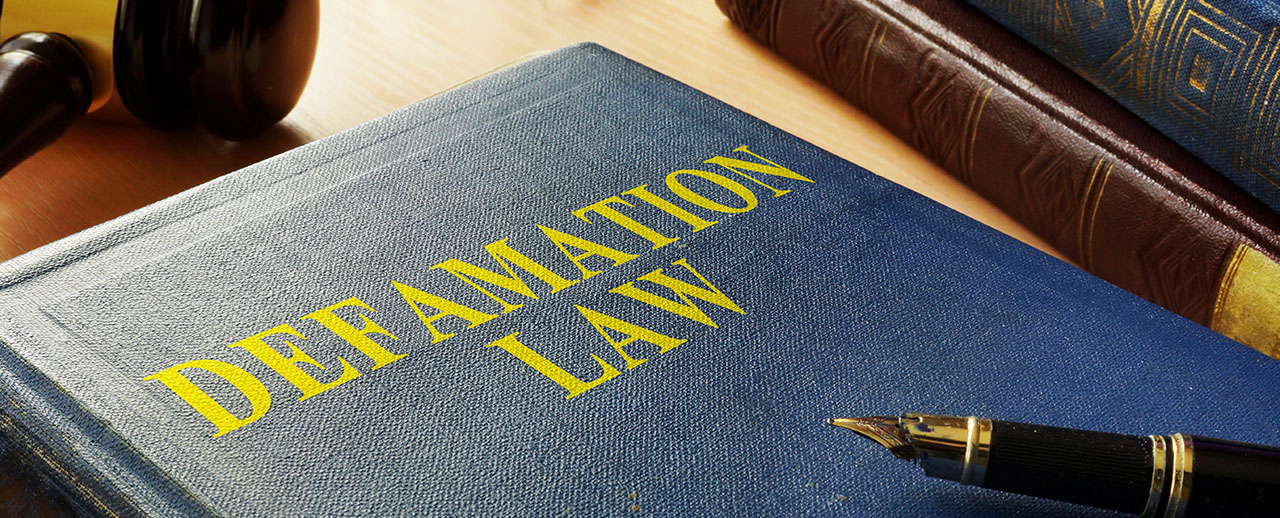
Under Indian law, defamation is both a criminal (punishable with imprisonment) as well as civil offence (punishable through the award of damages). Defamation as a civil offence is punishable under the law of torts, whereas, the criminal law on defamation is codified under the Indian Penal Code, 1860 (“IPC”).
Deconstructing Indian Defamation Law
1. Section 499 of the IPC
This Section states that:
“Whoever, by words either spoken or intended to be read, or by signs or by visible, representations makes or publishes any imputation concerning any other person intending to harm, or knowing or having reasons to believe that such imputation will harm the reputation of such person, is said, except in the cases hereinafter excepted, to defame that person.”
Section 499 also provides for defamation of deceased persons. It states that “an imputation would amount to defamation of a deceased person if it would harm the reputation of the person had she been living and is made with the intention to hurt the feelings of his family or relatives.”
In a recent defamation case concerning a deceased person, the Supreme Court dismissed a petition for a stay on the movie ‘Gangubai Kathiawadi’ filed by a man claiming to be the adopted son of Gangubai. The man alleged that the movie defamed the image of his adoptive mother with her portrayal as a prostitute, brothel keeper and mafia queen.1 Since the movie is based on a book, ‘Mafia Queens of Mumbai’, the authors of the said book were also respondents in this case.
The Supreme Court observed that for maintaining an action in tort of defamation, the applicant for interim relief would have to satisfy the Court, that: (i) the applicant was a member of the family or a near relative of the person defamed; (ii) what was stated about the deceased family member/relatives was untrue; and (iii) what was stated would lower the character and reputation of the deceased. Mere hurting of sensibilities would not constitute defamation if the person said to be defamed is not lowered in character or credit in the eyes of others. However, the petitioner could not prove that he is a family member or near relative of Gangubai. Moreover, the Supreme Court held that prima facie the movie is an artistic expression within the parameters of law.
It is pertinent to understand the following essentials that constitute an offence of defamation, to identify statements and content that may be construed as defamatory.
2. Essentials of Defamation
(i) Imputation how made – The imputation must be made or communicated to some person other than the person about whom it is made or published, this is the essence of publication in the context of Section 499.2 The imputation could be made or communicated by: (a) words, either spoken or written; or (b) by making signs; or (c) visible representations.
(ii) Imputation must concern a particular person or persons – The imputation must concern some particular person or persons whose identity can be established.
It would also amount to defamation if the imputation concerns a company or an association or collection of persons as such. When defamation is alleged against a class of persons, such class must be a well-defined class and not an indeterminate and indefinite body (such as Marxists or Leftists).3 For instance, the Rashtriya Swayamsevak Sangh (RSS) is a definite and identifiable class or body.4
(iii) Intent to harm – The imputation must have been made with the intention of harming or knowing or having reason to believe that it will harm the reputation of the person about whom it is made. For the purpose of defamation, it would be sufficient that the accused intended or knew or had reason to believe that the imputation made by him would harm the reputation of the other person. Thus, mens rea is a condition precedent to constitute the said offence.5 Further, it is not necessary that the other person actually suffers directly or indirectly any harm from the imputation.
It is relevant to note that, explanation 4 to Section 499 states that no imputation is said to harm a person’s reputation, unless that imputation directly or indirectly, in the estimation of others, lowers the moral or intellectual character; credit; or character in respect of his caste, or causes it to be believed that the body of that person is in a loathsome state, or in a state generally considered as disgraceful.
3. Exceptions to Defamation
Section 499 provides for 10 exceptions to defamation, the first exception being – ‘the defence of truth’. There are two conditions for truth to become an effective defence in a complaint of defamation, one is that it should be factually correct, and the other is that it should be in public interest.6 Generally if the alleged defamatory statement is based on a public record including court records, it becomes unobjectionable.7
Further, ‘public good’ under this exception is a matter of evidence and not conjecture.8 The other exceptions are the following:
(i) Public conduct of public servant;
(ii) Conduct of any person touching any public question;
(iii) Publication of reports of proceedings of courts;
(iv) Merits of the case decided in court or conduct of witnesses and others concerned;
(v) Merits of public performance;
(vi) Censure passed in good faith by person having lawful authority over another;
(vii) Accusation preferred in good faith to authorized person; and
(viii) Imputation made in good faith by person for protection of his or other’s interests.
In Tiruvengadda Mudali vs. Tripurasundari Ammal, the Madras High Court observed that the exceptions to Section 499, must be regarded as exhaustive as to the cases which they purport to cover, and recourse can be had to the English common law to add new grounds of exception to those contained in the statute.9
Punishment for Defamation
Section 501 of the IPC states that any person who prints or engraves any matter, knowing or having good reason to believe that such matter is defamatory of any person, shall be punished with simple imprisonment for a term which may extend to 2 years, or with fine, or with both.
Liability of Publishers and Other Persons
Publishers, movie/visual content producers and other persons publishing content in India must take note of the above law on criminal defamation to avoid liability under the same. Various books, movies and shows have been banned in India on account of defamatory content such as the book ‘Godman to Tycoon: The Untold Story of Baba Ramdev’ on the life of yoga guru Ramdev in 2017 and an episode of the Netflix series ‘Bad Boy Billionaires’ based on Ramalinga Raju in 2020.
In case a person is held guilty of criminal defamation, he/she could also be subject to colossal monetary liabilities. A 100 crores defamation suit against the publishers and editors of ‘The Wire’, a news website, has been filed by Bharat Biotech for publication of articles concerning the company and its covid vaccine ‘COVAXIN’. It has been alleged that the website published these articles without proper fact checking. A Telangana court directed the website to take down 14 articles.
In light of the above, it is recommended that parties err on the side of caution and undertake a legal review of their content to identify issues of defamation and rectify the same before publication.
1 Babuji Shah vs. Hussain Zaidi and others, SLP(c) 15711/2021
2 Khima Nand vs. Emperor, 169 Ind. Cas. 622
3 Krishnaswami vs. C.H Kanaran, 1971 KLT 145
4 Tek Chand Gupta vs. R.K. Karanjia, 1969 Crl.L.J 536
5 Alpana Ghosh v. Amitava Ghosh, CRR 278 of 2018
6 Abk Prasad vs. Union of India (Uoi) and Ors., 2002 (3) ALT 332
7 Rajagopal vs. State of Tamil Nadu, AIR 1995 SC 264
8 Sewakram vs. R.K. Karanjiya, AIR 1981 SC 1514
9 ILR 49 Mad 728
















